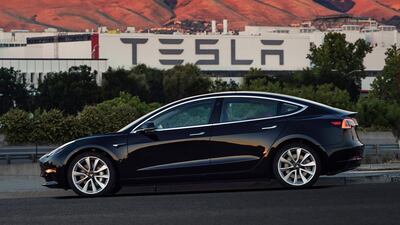Oil prices may fall to as low as $35 per barrel in 2018, prompted by Chinese and Indian efforts to tackle pollution and the increased worldwide uptake of electric cars, according to Steen Jakobsen, the chief economist of the Danish investment bank Saxo Bank.
"I think down the road, this whole electrification which is a big issue in 2018 will really kick off," Mr Jakobsen told The National in a telephone interview. "The reason I think it will be big is that the single biggest issue in China is pollution and a way to deal with it is to get electric cars. On top of that, India has a similar problem."
The push towards electric vehicles has gained traction in 2017, amid Tesla’s high profile release of new electric car and truck models, Volvo’s commitment to produce only electric cars and hybrid cars by 2019, and Volkswagen’s commitment to spend $40 billion on developing electric and driverless cars. Earlier this summer France and the UK said they plan to ban combustion engines by 2040 and China has said it is studying such a move.
"The two most populous nations in the world will lead the charge towards electrification and as that happens investment into batteries and alternative energy will explode because this is going to be the single biggest concentration of growth in one sector since the internet. If you get better batteries, you reduce the demand for fossil oil,” Mr Jakobsen said.
__________________
Read More:
S&P raises 2018 Brent oil price forecast on ongoing cuts and strong demand
__________________
A quicker than expected shift to electric cars is likely to add further pressure on energy prices in the wake of the massive crash in oil prices in late 2014, spurred by an increase in supply from North America. That change in the supply and demand dynamic on account of the shale gas revolution happened quicker than many analysts expected.
Mr Jakobsen, who is known for making bold predictions, said that consensus estimates for the price of oil were not taking into account the rapid pace of technological change in the field of renewable energy and the adoption of electric cars globally.
S&P Global Ratings this week upped its 2018 forecast for the average price of Brent to $55 per barrel on the assumption that Opec and other oil producing countries will extend cuts they agreed on at least into most of next year. The New York-based investment bank Goldman Sachs however has warned that prices could fall if Opec members don't meet market expectations when they meet in Vienna on November 30.
Brent crude oil, currently trading around $63 per barrel, has gained 40 per cent since June on the back of output cuts agreed by Opec and other producers last November.
Elsewhere, Mr Jakobsen said that prices of stocks globally did not appear to be underpinned by solid economic growth that many investors are banking on. As a result, the S&P500, the benchmark equity gauge of US stocks, may correct by 25 to 30 per cent. The US dollar is also likely to weaken, boosting gold prices as well as the British pound, the Euro and emerging market currencies, he added.

